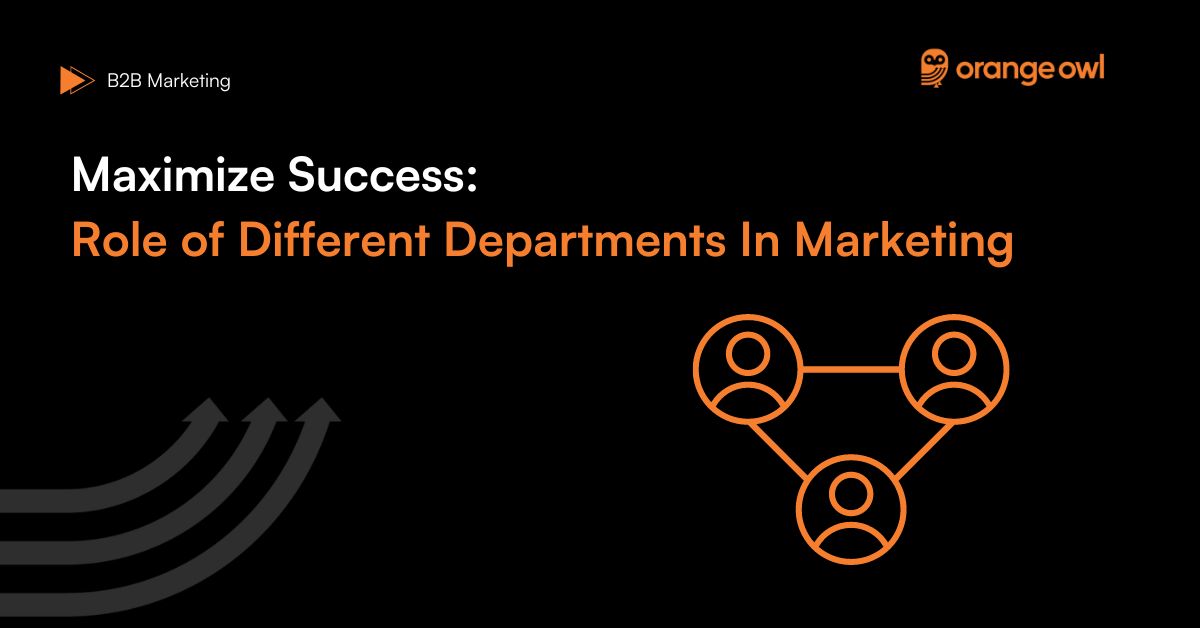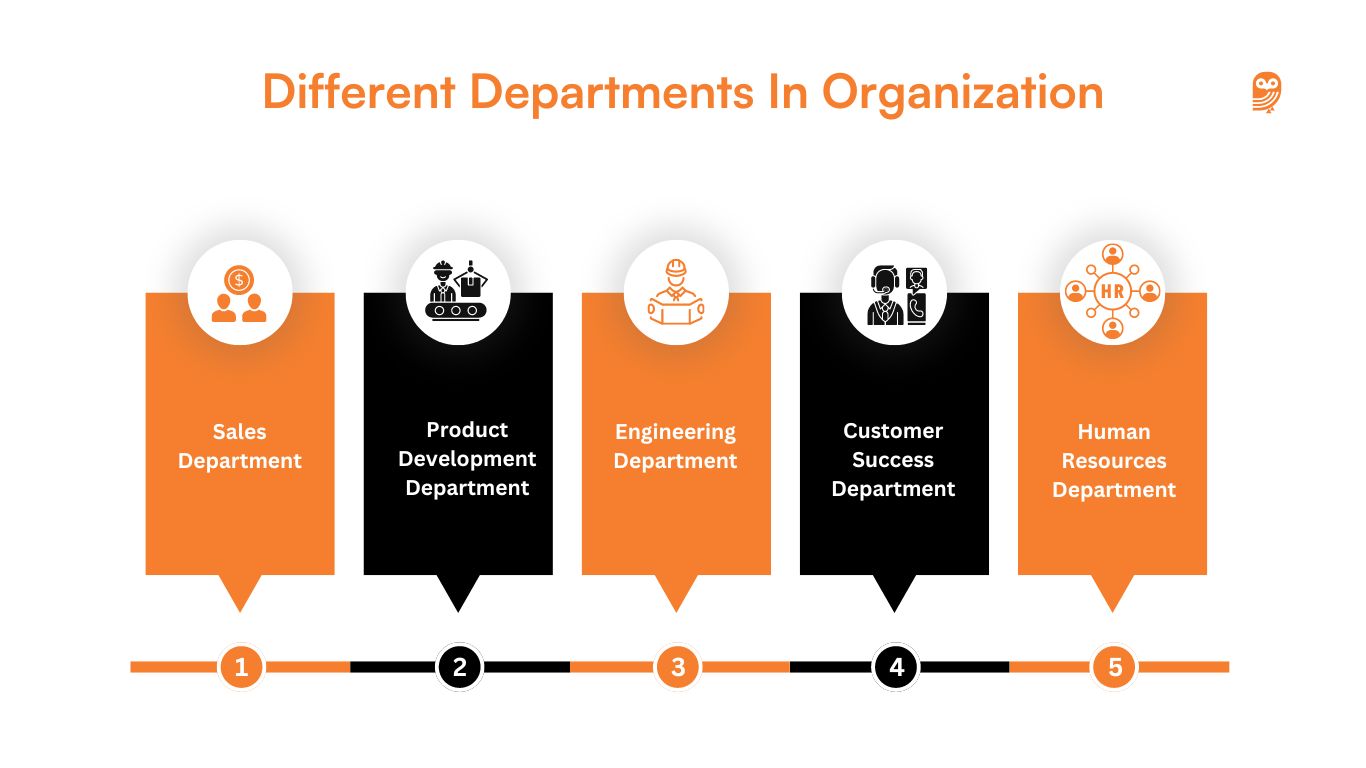Maximize Success: Role of Different Departments in B2B Marketing
Vivek Goel
May 27, 2024

Table of Contents
In the modern business landscape, marketing is no longer confined to a single department. Instead, successful marketing strategies require collaboration and input from every corner of an organization, especially in B2B tech companies. Each department plays a unique role in shaping and executing marketing initiatives, ultimately contributing to the company’s overall success. According to a study by LinkedIn, 87% of B2B marketers agree that collaboration between marketing and other departments is critical for driving company growth and success. In this comprehensive guide, we’ll explore the vital role that each department in a typical B2B tech company plays in driving marketing success.
Role of Different Departments in B2B Marketing

Sales Department
The sales department is often the frontline of customer interaction in a B2B tech company. Their insights and efforts are invaluable for shaping marketing strategies. Here are five ways the sales department contributes to marketing success:
1. Customer Insights Sharing
Sales teams interact directly with prospects and customers, gaining valuable insights into their pain points, objections, and needs. Sharing these insights with the marketing team helps in crafting targeted messaging, content, and campaigns that resonate with the target audience.
2. Content Creation Support
Sales reps are well-versed in the challenges and questions that prospects have. They can provide input for content creation, suggesting topics for blog posts, whitepapers, case studies, and social media content based on real customer interactions.
3. Feedback Loop
Sales teams serve as a crucial feedback loop for marketing efforts. They provide feedback on the effectiveness of marketing materials, such as sales collateral and product messaging, helping marketing teams refine their strategies for better alignment with customer needs.
4. Lead Nurturing Assistance
Sales teams assist in lead nurturing efforts by providing personalized follow-up based on marketing-generated leads. They tailor their communications to address specific pain points or interests identified through marketing interactions, helping to move leads further down the sales funnel.
5. Customer Testimonials and Case Studies
Sales reps gather customer testimonials and success stories, which can be powerful assets for marketing campaigns, website content, and sales collateral. These testimonials help build credibility and trust with potential customers.
Product Development Department
The product development department is responsible for creating and enhancing the company’s products or services. Their insights into product features and market trends are essential for effective marketing. Here are five ways the product development department contributes to marketing success:
1. Feature Highlighting
Product teams identify and highlight key features and functionalities that differentiate the company’s products from competitors. They provide in-depth knowledge about product capabilities, empowering marketing to create compelling messaging and content.
2. User Experience Enhancement
Product teams shape the user experience (UX) of the company’s products. By improving usability and overall user satisfaction, they indirectly contribute to positive word-of-mouth marketing and customer retention.
3. Beta Testing and Feedback Integration
Product teams engage customers in beta testing programs to gather feedback for product refinement. They collaborate with marketing to leverage positive feedback and testimonials in marketing campaigns, demonstrating the value of the product.
4. Competitive Analysis
Product teams monitor the competitive landscape, providing insights into competitors’ strengths and weaknesses. This information enables marketing to craft targeted messaging that emphasizes the unique value proposition of the company’s products.
5. Thought Leadership Content
Product teams collaborate with marketing to create thought leadership content that showcases the company’s expertise and educates potential customers. This content establishes the company as a trusted authority in the industry, driving brand credibility.
Engineering Department
The engineering department is responsible for developing and maintaining the company’s technology infrastructure and solutions. Their technical expertise and insights are crucial for marketing success. Here are five ways the engineering department contributes to marketing:
1. Feature Innovation
Engineering teams develop innovative features that address customer needs and market trends. These features provide compelling selling points for marketing campaigns, attracting new customers and retaining existing ones.
2. Performance Optimization
Engineering teams optimize the performance and reliability of the company’s technology solutions. They ensure fast loading times, high availability, and robust security measures, enhancing the overall user experience and building trust with potential customers.
3. Integration Partnerships
Engineering teams identify integration opportunities with complementary software solutions. By developing integrations that enable seamless interoperability, they enhance the value proposition of the company’s solutions and open up new market opportunities.
4. User Feedback Loop
Engineering teams collect and analyze user feedback to identify usability issues and feature requests. By addressing user feedback and iterating on product improvements, they improve customer satisfaction and loyalty, which marketing can leverage in promotional materials.
5. Technical Content Creation
Engineering teams collaborate with marketing to create technical content that showcases the company’s technology solutions. This content educates potential customers about the product’s capabilities and use cases, establishing the company as a thought leader in the industry.
Customer Success Department
The customer success department is responsible for ensuring customer satisfaction and retention. Their efforts are critical for building long-term relationships and driving advocacy. Here are five ways the customer success department contributes to marketing success:
1. Customer Testimonials and Case Studies
Customer success teams gather customer testimonials and success stories, which are powerful assets for marketing campaigns. These testimonials build credibility and trust with potential customers, driving conversion.
2. Referral Programs
Customer success teams incentivize satisfied customers to refer new business to the company. By encouraging referrals through programs or rewards, they expand the company’s customer base and drive revenue growth.
3. User Community Engagement
Customer success teams foster a sense of community among users, encouraging knowledge sharing and peer support. This engagement strengthens customer relationships and promotes customer retention, which marketing can showcase in promotional materials.
4. Upselling and Cross-Selling Opportunities
Customer success teams identify upselling and cross-selling opportunities based on customer needs. By recommending relevant upgrades or add-on services, they increase customer lifetime value and revenue, which marketing can support through targeted campaigns.
5. Feedback Collection and Product Advocacy
Customer success teams gather feedback from customers and advocate for their needs within the company. This feedback influences product roadmap decisions and ensures that the company continues to meet customer expectations, which marketing can highlight as a commitment to customer satisfaction.
Human Resources Department
The human resources department is responsible for recruiting, training, and developing employees. Their efforts are essential for fostering a positive company culture and employer brand. Here are five ways the human resources department contributes to marketing success:
1. Employer Branding
HR teams cultivate a strong employer brand that reflects the company’s values and culture. A positive employer brand attracts top talent, which contributes to the company’s success and growth, as marketing can highlight in recruitment materials.
2. Employee Advocacy
HR teams encourage and facilitate employee advocacy programs that turn employees into brand ambassadors. By amplifying marketing messages through personal networks, employees help increase brand visibility and credibility.
3. Talent Acquisition Strategies
HR teams align talent acquisition strategies with marketing goals by hiring employees with relevant skills and marketing aptitude. By ensuring that the marketing team has the talent and expertise needed for success, HR supports marketing effectiveness.
4. Training and Development
HR teams invest in training programs that enhance employees’ marketing skills and knowledge. By offering workshops and certifications in areas such as digital marketing, HR helps employees stay current with industry trends and best practices, enabling effective marketing execution.
5. Internal Communication
HR teams facilitate internal communication channels to ensure that employees are informed and engaged with marketing initiatives. By disseminating marketing messages and fostering alignment, HR helps rally employees around common objectives, driving marketing success.
Conclusion
In conclusion, every department in a B2B tech company plays a vital role in driving marketing success. By recognizing the unique contributions of each department and fostering cross-departmental collaboration, companies can maximize the effectiveness of their marketing efforts and achieve sustainable growth and success. Leadership must set the tone for collaboration and ensure that marketing is viewed as a collective responsibility across the organization. With a unified approach to marketing and well-defined go-to-market (GTM) strategies, B2B tech companies can overcome challenges, seize opportunities, and thrive in today’s competitive landscape.
